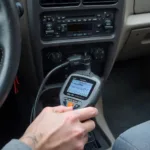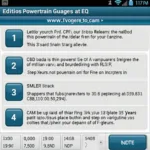Troubleshooting your 2009 Subaru? Understanding those mysterious OBD2 codes is the first step towards a fix. Whether you’re seeing a check engine light, experiencing performance issues, or just want to stay ahead of potential problems, knowing how to interpret these codes can save you time and money. This article will guide you through everything you need to know about 2009 Subaru OBD2 codes, from common issues to troubleshooting tips.
Decoding these codes can seem daunting, but it’s a crucial skill for any Subaru owner. With a little knowledge, you can quickly pinpoint the source of your vehicle’s troubles and take the necessary steps to resolve them. We’ll cover the different types of codes, what they mean, and how to use an OBD2 scanner effectively on your 2009 Subaru.
Common 2009 Subaru OBD2 Codes and Their Meanings
Several OBD2 codes frequently pop up in 2009 Subarus. These range from minor issues to more significant problems requiring immediate attention. Let’s explore some of the most common codes:
- P0420: Catalyst System Efficiency Below Threshold (Bank 1). This often indicates a failing catalytic converter.
- P0171: System Too Lean (Bank 1). This code suggests an issue with the air/fuel mixture, often caused by a vacuum leak, faulty oxygen sensor, or fuel injector problem.
- P0300: Random/Multiple Cylinder Misfire Detected. This code points to a misfire, which could stem from spark plugs, ignition coils, or fuel delivery issues.
- P0455: Evaporative Emission Control System Leak Detected (Gross Leak). This usually signifies a leak in the EVAP system, such as a loose gas cap, damaged fuel lines, or a faulty charcoal canister.
- P0442: Evaporative Emission Control System Leak Detected (Small Leak). Similar to P0455, this suggests a smaller leak within the EVAP system.
You can find the OBD2 port location on many Subaru models, including the Legacy and Outback, easily online. Knowing where to plug in your scanner is the first step in diagnosing these trouble codes.
How to Use an OBD2 Scanner on a 2009 Subaru
Using an OBD2 scanner on your 2009 Subaru is straightforward:
- Locate the OBD2 port. In most 2009 Subarus, it’s located under the dashboard on the driver’s side. Check your owner’s manual or resources like obd2 port in 2009 subaru outback for precise location.
- Plug the OBD2 scanner into the port. Make sure the connection is secure.
- Turn the ignition key to the “on” position (without starting the engine). This powers up the OBD2 system.
- Turn on the OBD2 scanner. Follow the on-screen instructions to read the codes.
- Record the codes displayed. These codes are essential for further diagnosis and repair.
Remember, having the correct information about your vehicle’s OBD2 port location is crucial. Resources like subaru legacy obd2 port location can be extremely helpful.
“A thorough understanding of OBD2 codes empowers car owners to take control of their vehicle’s maintenance,” says automotive expert, John Miller, ASE Certified Master Technician. “It’s the first step in effective troubleshooting and can significantly reduce repair costs.”
What to Do After Retrieving 2009 Subaru OBD2 Codes
Once you have the codes, the next step is to understand their meaning and develop a plan of action. Resources like online OBD2 code databases, repair manuals, and automotive forums can provide valuable insights.
Troubleshooting Tips for 2009 Subaru OBD2 Codes:
- Research the codes thoroughly: Don’t jump to conclusions based on a single code. Investigate all possibilities.
- Check for simple fixes: Sometimes, a loose gas cap or a faulty sensor can trigger a code. Start with the easiest solutions.
- Consider the context: The driving conditions, recent repairs, and your car’s history can offer clues about the root cause.
You might also find it helpful to check out resources related to other Subaru models, as they might share similar systems. For example, information on the obd2 port subaru outback might provide relevant insights for your 2009 Subaru.
“Don’t be afraid to seek professional help if you’re unsure about the diagnosis or the necessary repairs,” advises Sarah Chen, Automotive Engineer. “A qualified mechanic can accurately diagnose the problem and ensure a proper fix.”
Conclusion
Understanding 2009 Subaru OBD2 codes is essential for any owner. By familiarizing yourself with common codes and using an OBD2 scanner effectively, you can take proactive steps to maintain your vehicle and avoid costly repairs. Remember to research thoroughly, consider all possibilities, and seek professional advice when needed.
FAQ
-
What does the check engine light mean on my 2009 Subaru?
- The check engine light can indicate a range of issues, from minor to serious. It’s triggered by the OBD2 system when it detects a problem.
-
Where is the OBD2 port on my 2009 Subaru?
- It’s typically located under the dashboard on the driver’s side.
-
Can I clear OBD2 codes myself?
- Yes, you can clear codes with an OBD2 scanner, but it’s important to address the underlying issue first.
-
What if the codes return after clearing them?
- If the codes reappear, it indicates the problem hasn’t been resolved. Further diagnosis is necessary.
-
How often should I check my 2009 Subaru for OBD2 codes?
- It’s good practice to check periodically, especially if you notice any unusual performance issues.
-
Are all OBD2 scanners compatible with my 2009 Subaru?
- Most standard OBD2 scanners are compatible.
-
Can I use my smartphone as an OBD2 scanner?
- Yes, there are OBD2 adapters and apps that allow you to use your smartphone for code reading.
Need assistance? Contact us via WhatsApp: +1(641)206-8880, Email: [email protected] or visit us at 789 Elm Street, San Francisco, CA 94102, USA. Our customer service team is available 24/7.

